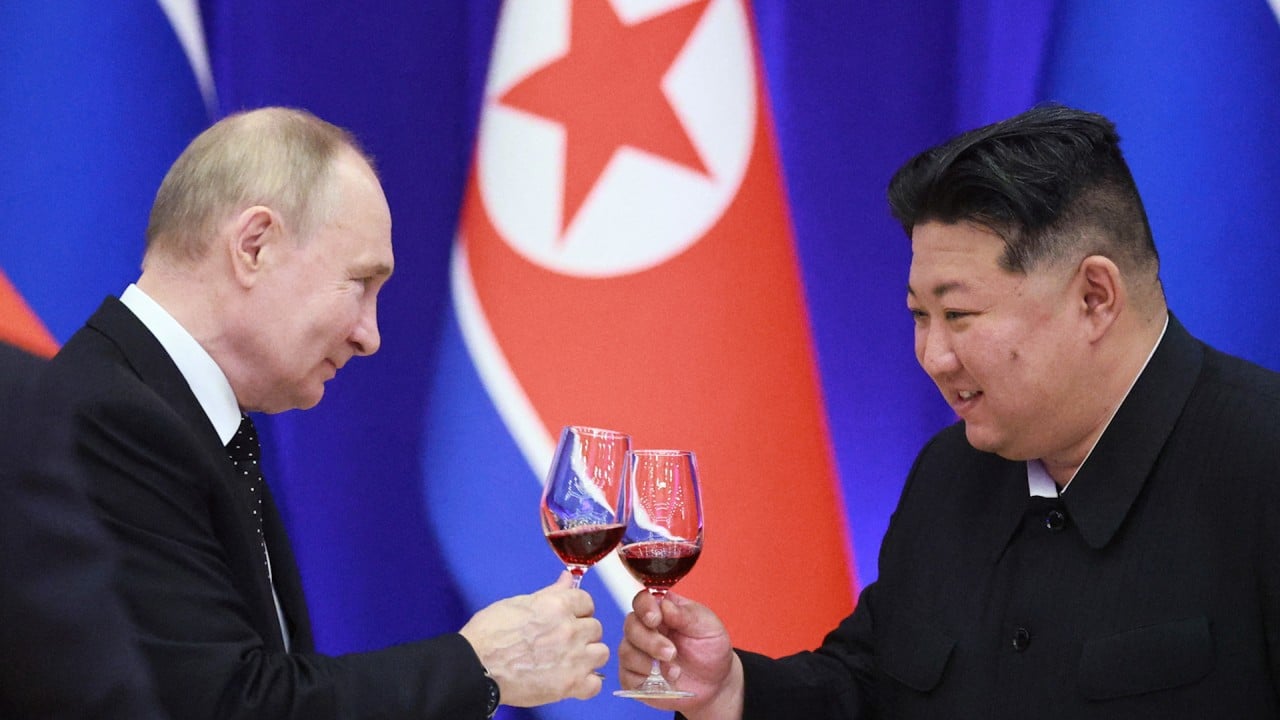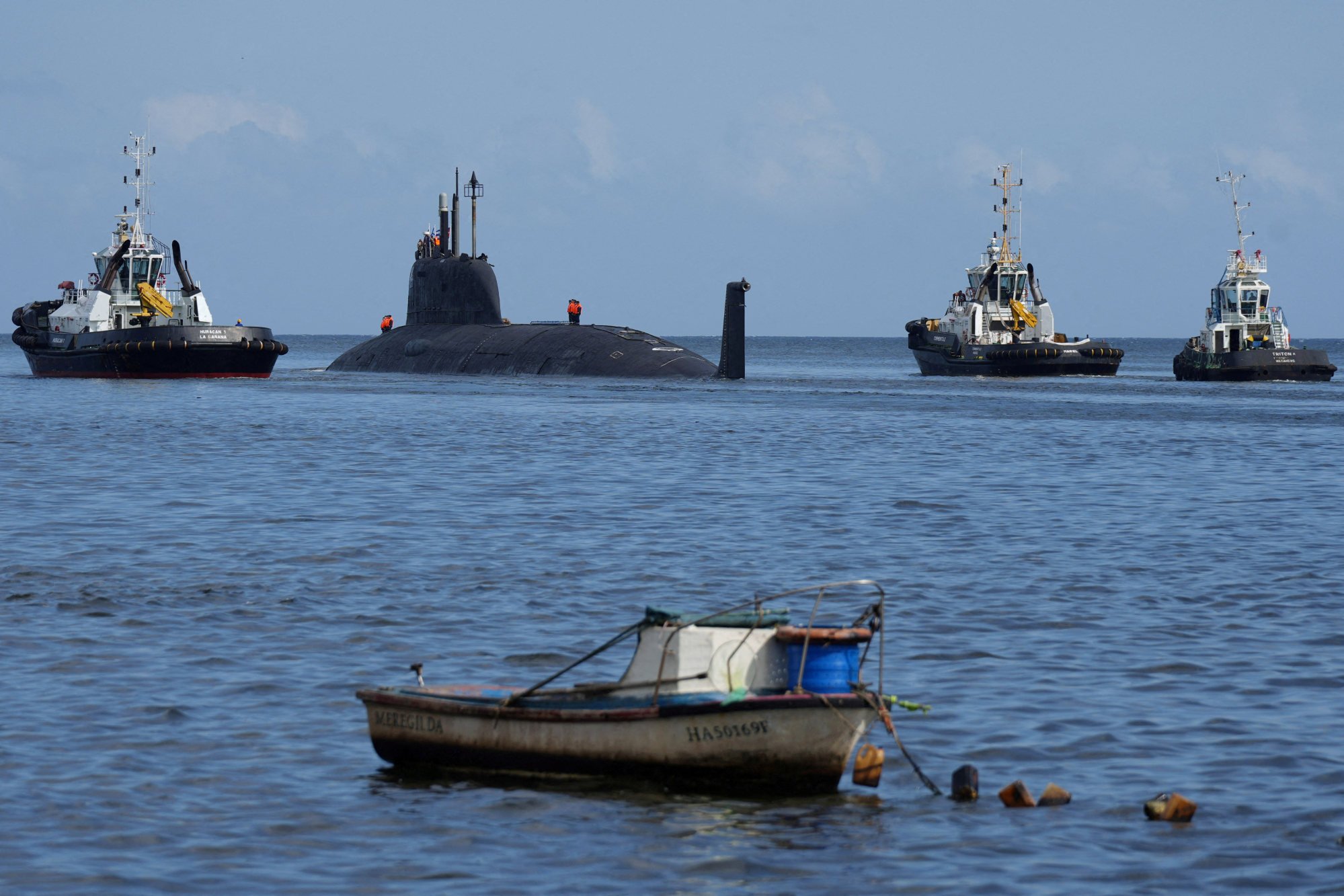Russian President Vladimir Putin might have finally dislodged the US Republican Party from the spell many of them were under for the past few years, or at least loosened the bonds. By linking arms with North Korea’s leader Kim Jong-un and then suggesting changes in his nuclear strike policy while in Vietnam, Putin’s two-country tour washed away another chunk of the ground that many in the party have stood on when they have dismissed calls from the centrists in their midst about the threat that Russia poses.
Speaking to reporters in Vietnam a day after visiting nuclear-armed North Korea for a summit with Kim, Putin gave us a split-screen moment that smacked of history as soon as it occurred. Around the same time Mike Turner, the Republican chair of the House Intelligence Committee, was demanding the Biden administration provide more details about Russia’s nuclear capabilities, Putin said Russia was mulling changes to its doctrine on the use of nuclear weapons.
Turner, a congressman from Ohio representative, insisted that Americans needed more information about what he called “day zero”. This is when Russia might be able to use anti-satellite nuclear weapons to bring the West to its knees.
It is against this backdrop that some senior Republicans are leaping from one angle of attack against US President Joe Biden – that his administration’s fixation on Ukraine is wasteful and ineffective – to the opposite side of the foreign policy spectrum, one that is more reflective of Turner’s.
We are hearing positions more along the lines of this comment Turner made in his remarks about Putin’s trip to Pyongyang: “We’ve all sort of felt intuitively that China, Russia, North Korea, Iran are working together in both their development of capabilities and in their threats to the United States. These symbolic meetings, I think, should allow us to focus on this is a threat that has already been occurring.”

03:05
Putin, Kim sign ‘strongest ever’ defence treaty amid growing tensions with the West
Putin, Kim sign ‘strongest ever’ defence treaty amid growing tensions with the West
Other senior Republicans are speaking up about the threat Russia poses, as well. They include Florida Senator Rick Scott, who lent his support to Moscow earlier this year by voting against military aid to Ukraine.
In another example of the tack Republicans are taking in an attempt to remain critical of the Biden administration, Scott had been attacking Biden for “appeasing terrorist regimes like Iran, a wide-open border and now Russian warships in Cuba” – a reference to a fleet of Russian warships which recently spent five days in Havana – even before Putin declared his intention to alter his nuclear strike policy.
Senator Lindsay Graham is not as harsh a critic of aid to Ukraine as Scott or some others in his party, but nonetheless he voted against a bill in February that would have included funding for Ukraine and measures to bolster border security. He justified that move, as Trump and many of his allies have, by insisting more resources are needed to stop immigrants from entering the United States.
Weeks later – a lifetime for Ukrainian President Volodymyr Zelensky and his country – Graham ultimately backed the measure that cleared the way for about US$60 billion in aid for Kyiv, as well as support for Israel and Taiwan. He has since moved to a harder line against Moscow by pushing for the seizure of frozen Russian assets to bolster that aid.

Republicans such as Scott and Graham are confronted more than ever with a serious dilemma. Deference to the Kremlin was a necessary tactic in a culture war they are waging at home and abroad. This made sense – politically, but perhaps not morally – given what appeared to be the low odds that Russia’s invasion of Ukraine would go nuclear and the fact that many Americans are more concerned with domestic issues.
Meanwhile, Democrats also need more unity on Russia. Oregon Senator Jeff Merkley and Vermont Senator Peter Welch also voted against the aid package in April, largely over objections to Israel’s war in Gaza. They are wrong to make Democrats as responsible as far-right Republicans for putting a sworn enemy of the US on the borders of Washington’s Nato allies.
These Democrats have been too deeply invested in the Gaza crisis to prioritise support for Ukraine. It remains to be seen how hawkish they will become on Moscow now that Putin has shown he will jump over any red lines to restore his sense of Russian greatness.
They should take cues from what’s happening among Republicans, more of whom appear to be wondering if winning a culture war is worth sparking a nuclear one.
Robert Delaney is the Post’s North America bureau chief

